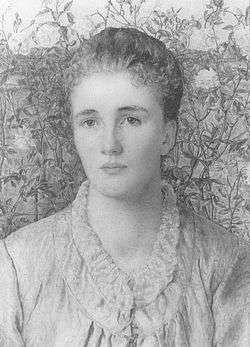Louise Creighton

Louise Hume Creighton, née von Glehn (7 July 1850 – 15 April 1936) was a British author of books on historical and socio-political topics and an activist for greater role of women both within society and within the Church of England.[1]
Early Life
Born at Peak Hill Lodge in Sydenham, on July 7, 1850, she was one of the younger daughters of Robert von Glehn, a City of London merchant and his wife, Agnes Duncan. A brother of Alfred de Glehn, the designer of the French steam locomotive engine. Educated predominately at home, Creighton passed with honours the first London University higher examination for women. A prolific reader and a keen student of both the writings of John Ruskin and the historian J.R. Green.
In 1872, she married Mandell Creighton, an Oxford educated historian who later became both a Cambridge Professor in ecclesiastical history and was appointed a Church of England bishop of Peterborough in 1891 and London in 1897. The couple had seven children: Beatrice in 1872, Lucia in 1874, Cuthbert in 1876, Walter in 1878, Mary in 1880, and Oswin in 1883; and finally Gemma, born in 1887.[2]
Creighton was a popular author, particularly of historical biographies and stories for children including the successful "Child's First History of England".
Later Career
After the death of her husband in 1901, Creighton became an influential advocate for women's suffrage and social reform. As well as writing and editing books she served on two Royal Commissions and the Joint Committee of Insurance Commissioners.
As a member of the Standing Committee of the Society for the Propagation of the Gospel she helped promote the work of women missionaries and took a leading role chairing the women's meetings at the Pan-Anglican Congress of 1908.
After nearly twenty years living in a grace-and-favour apartment at Hampton Court Palace, Creighton moved back to Oxford in the late 1920s and served on the governing board of Lady Margaret Hall. After a period of declining health, she died on the 15 April 1936 and her cremated remains were buried in St. Paul's Cathedral, London in the grave of her husband.
See also
Notes
- ↑ Covert 2000, pp. 67–72, Covert 2000, pp. 295–317
- ↑ Covert 2000, pp. 83–126
References
- Covert, James (2000), A Victorian Marriage: Mandell and Louise Creighton, London and New York: Hambledon and London. Pp. xv, 412, 35 plates, ISBN 1-85285-260-7
- Covert, James Thayne (2004), "Louise Hume Creighton (1850–1936)", in Matthew, H. C. G.; Harrison, Brian, Oxford Dictionary of National Biography, Oxford: Oxford University Press, doi:10.1093/ref:odnb/38640
External links
- Works by Louise Creighton at Project Gutenberg
- Works by or about Louise Creighton at Internet Archive
|